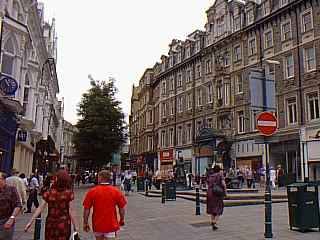

History


Newport is best remember for the last armed inserection on the british mainland which took place in 1839 at Newport by the Chartists, led by a former mayor of Newport, John Frost. He was one of the many Chartists who unsucessfully petitioned peacefully for more than a decade for reforms to Parliment concerning democratic rights. Even today the bullet holes can be still seen clearly in the pillars of what was once the Westgate Hotel in Westgate Square.
The Town is also renown for it's transportation, via it's famous busy docks which originally handled the county's abundance of iron, steel and coal and is still busy with timber and other bulk cargo today.
The Town is still very industrial today with large investments of companys bying up land to build their factories and office blocks. The town centre has been predestianised and modernised to caterer to modern day shoppers.
Population of the town must be around the 140,000 approx mark.
Landmarks & Places of Interest
Caerleon (Roman Village)
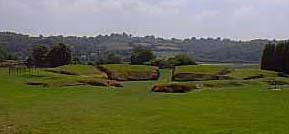
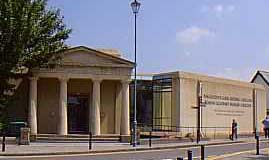
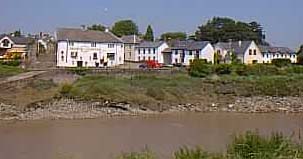
Caerleon is a fascinating village, which lies on the River Usk, just three miles from Newport. The ancient Roman Legionary Fortress of Isca, founded about 74 AD lies here also the famous amphitheatre which was completed about the same time as the Coloseum in Rome in 80 AD.
The is also a Roman Legionary Barracks here which is one of the only Roman Barracks on view anywhere in europe.
Caerleon is an attractive historic village which has much to offer to visitors. Plenty of Roman heritage and includes many buildings of interest as well as a selection of fine pubs, shops and family eating places.
Civic Centre
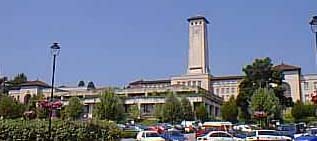
This is building contains the Law Courts and it contains the seat for local government.
Museum
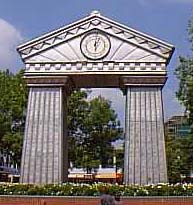 "In the Nick of
Time"-Newport Clock outside The Newport Museum.
"In the Nick of
Time"-Newport Clock outside The Newport Museum.
The Newport Museum, Art Gallery & Central Library are all housed in the one building in John Frost Square which makes it a focal point. The Museum contains a wealth of material from Roman archaeology to natural history. The Art Gallery has fascinating collections of historic and contemporay British paintings, and a changing exhibition programme
The first Report available in the Club's archives is that for 1877/78. This states that the "New Ground" had been acquired (leased) in 1877 and that membership had increased from 142 in April 1877 to 250 in April, 1878. The cost, just over �316, was paid for from the proceeds of Athletic meetings (�224) and Football matches (�14) together with private donations. This marked the first stage of the Club's development over the past 119 years - I wonder if the founders would ever have believed that in 1996 the game of rugby football under the union code would go openly professional for the first time.The Club then was not the Newport Athletic Club but the Newport Cricket, Athletic and Football Club as these were the only three "pastimes" undertaken at the time.Annual subscription to the Club was then �1 1s 0d; One Guinea (�1.05). For Football and Gymnasium only, the fee was half a guinea. Boys (under 16 years) paid at half rate.Apart from subscribing members, the Officers of the Garrison at Barrack Hill in Newport were invited to become Honorary Members (Playing) of the Club.
The committee of the day eventually decided that the Club Colours would be "Black and Amber" but only following much argument and discussion over whether the Colours should be dark blue or light blue or blue and black - Cardiff were then unformed and it makes you wonder somehow if we had chosen blue and black if they would be playing in black and amber today?
Information supplied by John Page, Web Administrator for Newport Rugby Club Ltd.
See The Newport Rugby Website at: http://www.newport-rfc.co.uk/
St.Woolas Cathedral
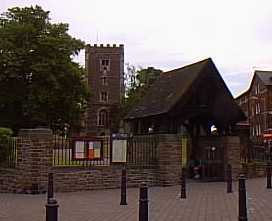
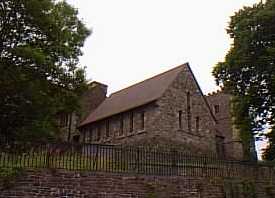
This is a medieval cathedral which sits on one of the high point of Newport.
Transporter Bridge

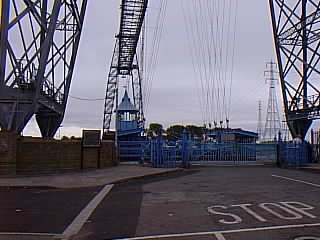
Built by a Frenchman Monsieur F Arnodin, the bridge was opened in 1906, to provide a river crossing between what was then the busy centres of the west and east banks of the River Usk. The bridge has a span of 645 feet measured from the centre of each its towers. The gondala is 33 feet long, 40 feet wide and travels at 10 feet per second and can carry a maxium of 6 cars or small vans at one time. The whole contrivance is driven by two electric motors.
There are four other transporter bridges in the world: Middlesborough, Warrington, Dulluth and Rendsburg. The Newport Transporter bridge has been restored to it's former glory and is a true landmark to the Town.
Tredegar House
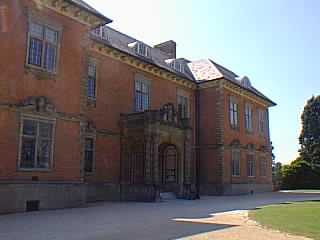
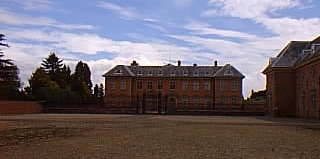
Tredegar House is one of the best examples of a 17th century, Charles II, mansion in Britain. The earliest surviving part of the building goes back to the early 1500s. All rooms have been restored and reflect the rise of the Morgan family through time. The stunning staterooms are adorned with fine paintings, carvings and elaborate ceilings. The gardens are beautiful and contain an Orangery. There is also craft workshops which hold a variety of craftspeople demonstrating their skills in making traditional musical instruments, stained glass and leather.
Tourist Information
Newport Tourist Information Centre, John Frost Square, Newport, NP9 1H2, UK; Tel: (044) 01633 842962
Caerleon Tourist Information Centre, 5 High Street, Caerleon, Newport NP6 1AE, UK; Tel: (044) 01633 422656
Welsh Tourist Board website: http://www.visitwales.com
Local Radio Stations:
Galaxy 101 Radio Station Red Dragon Radio Station
425 Net�1999